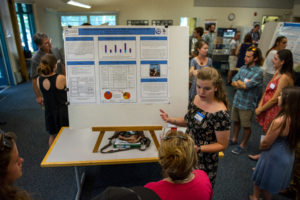Emma Newcomb, a 2018 SEA Fellow and Cammen Lab undergraduate research assistant, presented her research at a public, student-focused symposium held at the Darling Marine Center in Walpole, Maine earlier this week. The symposium was attended by >80 scientists, industry and community members, and the interested general public. Over 20 undergraduate students presented posters about their summer research experience, all linked by a shared goal to improve our understanding of the Maine’s coastal ecosystem to help benefit our coastal communities and economies. You can read more about the 2018 SEA Fellows Symposium here.

Photo by Holland Haverkamp
Emma’s research focused on classifying and quantifying marine mammal-human interaction cases that are observed in Maine and recorded by our collaborating stranding organizations, Marine Mammals of Maine and Allied Whale. Human interaction cases are currently categorized nationally as boat collision, gunshot, fisheries interaction, and “other”, and we are working to further describe this hard-to-define “other” category, which is this the most common type of human interaction for our stranded marine mammals in Maine. These interactions are normally typified by a human approach within 150 yards and oftentimes referred to as marine mammal harassment.
We would like to acknowledge the University of Maine System’s Research Reinvestment Fund (RRF) for their support of Emma’s summer research experience, part of an Interdisciplinary Undergraduate Research Collaborative grant. Emma will continue her research in this area during the academic year, supported by a NOAA Prescott grant.

